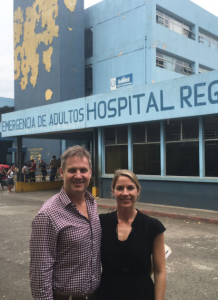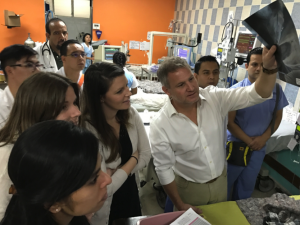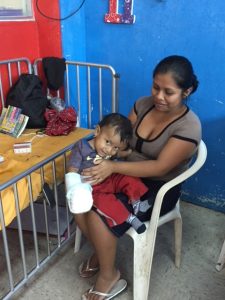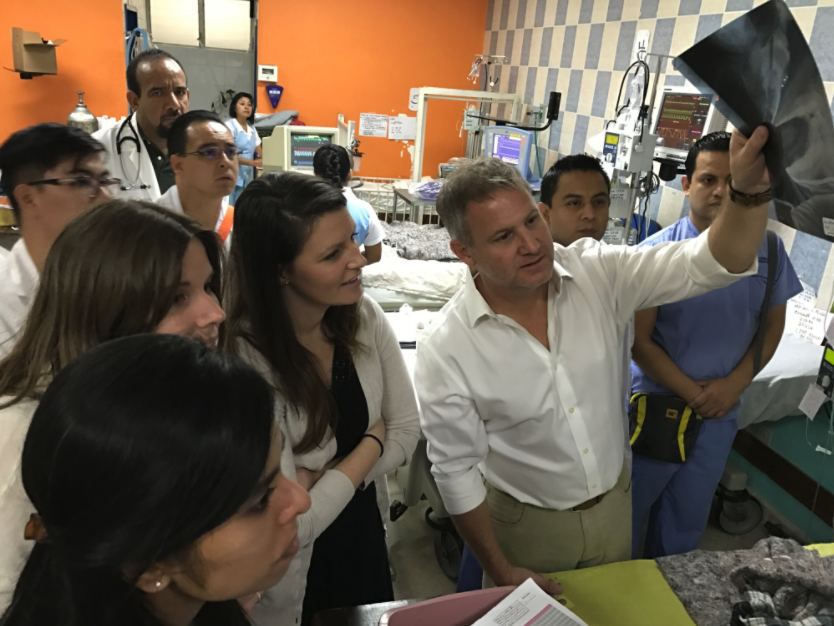NHS Alum Helps Open Largest Neonatal & Pediatric ICU in Central America
Writer / Christy Heitger-Ewing
 A 1990 graduate of Noblesville High School, Dwight Bailey not only knew that he wanted to pursue medicine as a career, but he also recognized early on that he sought the challenge of the complex physiology that accompanies critical care medicine. After graduating from Indiana University and Northwestern University, performing his pediatric residency at Hope Children’s Hospital and pediatric intensive care fellowship at Northwestern, he moved to Charlotte, North Carolina. There he joined the faculty at the University of North Carolina’s School of Medicine. For the past five years, he’s been the Medical Director of Pediatric Critical Care Medicine at Levine Children’s Hospital, which is part of Carolinas Healthcare System.
A 1990 graduate of Noblesville High School, Dwight Bailey not only knew that he wanted to pursue medicine as a career, but he also recognized early on that he sought the challenge of the complex physiology that accompanies critical care medicine. After graduating from Indiana University and Northwestern University, performing his pediatric residency at Hope Children’s Hospital and pediatric intensive care fellowship at Northwestern, he moved to Charlotte, North Carolina. There he joined the faculty at the University of North Carolina’s School of Medicine. For the past five years, he’s been the Medical Director of Pediatric Critical Care Medicine at Levine Children’s Hospital, which is part of Carolinas Healthcare System.
“Critical care medicine requires a very in-depth understanding of the entire organ systems of the body and requires a unique set of skills,” Bailey says. “I enjoy the challenge.”
In this role, Bailey has to make difficult, complex decisions in a rapid timeframe, dealing with everything from severe trauma to critical infections to cancer, neurological issues and critical congenital heart problems.
“Every day brings something different so the breadth is very exciting and challenging,” Bailey says.
The Heineman Foundation, a 501(c)3 non-profit organization, works closely with Bailey’s healthcare system. Located in Charlotte, they have been developing adult cardiac care in Central America for more than 25 years. Several years ago, the head cardio thoracic surgeon recognized the great need for pediatric intensive care and neonatal intensive care in Central America — particularly Guatemala. So he approached Bailey and asked if he’d be willing to join forces with him in this project.
It was no small favor. Not only was this a volunteer role, but it would also require traveling to Guatemala several times a year. After researching both the foundation and visiting the sites in Guatemala, Bailey recognized that this was an opportunity to have an immense impact on the care of children and infants in this poverty-stricken country.

The team conducted an on-site needs assessment, then identified doctors they could partner with to move forward. From there, they began developing multiple sites throughout Guatemala (they currently have two and are looking to add a third). In a third-world country, these hospitals have few resources and no ability to care for pediatric and neonatal illnesses. The first target was a hospital in Escuintla — a city with a population of two million.
“It was extremely poor conditions with a very high mortality rate,” Bailey says. “Over 50 percent of all children who were admitted to the hospital ended up being fatal cases.”
Due to their lack of resources and inability to care for complex issues, Bailey and the team have been partnering with this hospital primarily.
“The hospital needs to have a financial vested interest in the program —not just have us come in and build something, develop it and leave,” Bailey says. “It’s a long-term partnership with the local government, the hospital, physicians, nurses and all providers there on site because we need them to be stakeholders in the process for it to be successful.”
Over the course of two years, Bailey, his team, and the Heineman Foundation worked with the clinic staff and administration to not only provide equipment and hire nurses and physicians but also train the entire staff. In March 2017, they opened up the largest neonatal and pediatric intensive care unit in all of Central America. It has 36 beds —18 for pediatric intensive care and 18 for neonatal intensive care. Since the program’s inception, the mortality rate has dropped from more than 50 percent to less than 20 percent.

“It’s been very impactful,” says Bailey, who continues to provide training every three to four months. In addition, he does once-a-month instruction via telemedicine software. Bailey and his team are also implementing immunization, antibiotic and nutritional programs.
“As you can imagine, severe gastrointestinal illness and dehydration are an immense problem there,” Bailey says. “We’re trying to not just improve care in the facilities for those children who are critical but also implement prevention programs to minimize those who need to come and use those services.”
They are currently developing a second site in the city of Chimeltenango with the same basic structure as the first — outfitting the pediatric and neonatal units with equipment and providing staff training. The most challenging part of any project of this scope are the resource limitations.
“We work hard to stretch the resources we’re given, but we’re still limited in what we can do,” Bailey says. “And knowing there are still so many opportunities for improving care and improving lives that we can’t reach because the scale is almost insurmountable — that’s tough. Because the amount of need down there is overwhelming. We want to increase the scope of what we’re doing and increase the area that we’re impacting, but we’re still limited.”
To donate to the Guatemala/PICU/NICU project, visit heineman.org. Specify the PICU project when donating.





